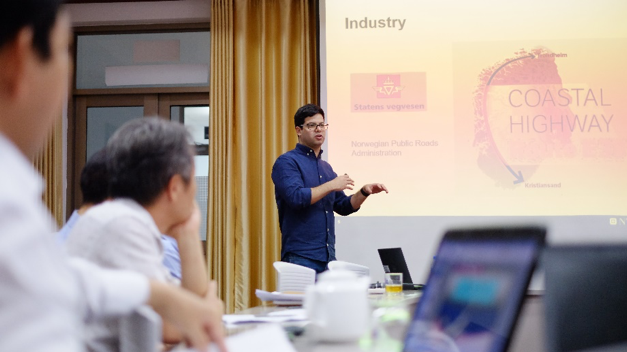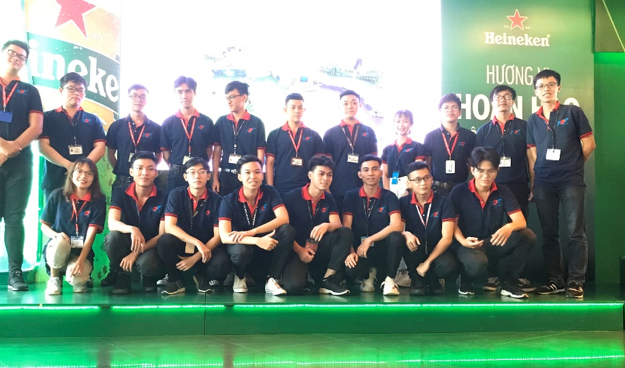I. INTRODUCTIONThe Department of Electronics and Telecommunications Engineering (DETE) consists of 17 full-time faculty (and 6 affiliated faculty) with active research and instructional programs in microelectronics, communications, networking, signal and image processing, VLSI circuits and computer-aided design, optoelectronics, and material sciences. Research and training provided by DETE cover a broad range of phenomena encountered in many contexts that are part of our everyday life. Applications include wireless mobile communications (including 5G technologies), radar, image processing, medical imaging, computer vision, computer networking, integrated circuit design for specific application, fiber optics, advanced materials for renewable energy systems, etc. Since 2013, faculty members from DETE have published more than 200 publications, including more than 100 publications indexed in ISI database. Prospective students will be provided with the contemporary knowledge that is currently taught in TOP 100 universities in the world, as well as be exposed to the latest research and industrial technologies in this broad area. DETE offers 1 regular undergraduate program, 1 high-quality undergraduate program and 1 joint undergraduate program with Saxion Universities of Applied Sciences in Netherlands, 1 Master program, 1 full-time PhD program and 1 joint PhD program (collaborated with VSB-Technical University of Ostrava). The undergraduate program offered by DETE is one of the first 4 programs of Ton Duc Thang University that are accredited by an international organization. DETE also has a strong connection with industrial corporations such as Renesas Design Vietnam, Viettel Corporation, SCTV, FPT, etc., who can provide the students with good opportunities for internship and career development. |
II. THE EXPECTED LEARNING OUTCOMES- Apply the ideology as well as current policies of the government in practice; - Apply general knowledge such as mathematics, physics, chemistry and programming languages; - Use English efficiently (IELTS 5.5 or equivalent), use Microsoft Office proficiently (equivalent to MOS certificate with the score at least 750/1000); - Analyze basic electronic circuits and basic communication systems; - Apply the specialized knowledge to regular process and systems in electronics and telecommunications; - Investigate the practical problems that may happen in electronic and telecommunication engineering and select the proper methods to solve unusual problems; - Improve and upgrade the electronic and telecommunication systems; - Conduct research to develop new solutions for the problems in electronics and telecommunications; - Design, implement and operate electronic circuits and telecommunication systems; - Provide consulting, to plan, manage and deploy the projects related to electronics and telecommunications; - Demonstrate the basic network management skill by getting the CCNA certificate, demonstrate the skill to prevent and avoid the accidents in industry; - Communicate effectively, including teamwork communication; - Manage time and resources effectively; - Display integrity and responsibility, follow strictly the safety rules and professional ethics; - Demonstrate a passion to self-study and self-research to improve the specialized knowledge to be able to solve the practical problems in engineering; or passion to be leaders or entrepreneurs. |
III. DIFFERENCE OF HIGH QUALITY PROGRAM- Class size: maximum 40 students/class; - All academic staff are Professors, Associate/Assistant Professors, and lecturers who have great reputation and teaching experience; - Modern classroom equipment; early access to new, high-quality experimental devices; support some specialized components in the process of making graduation projects; - Priorities in job introduction and postgraduate scholarship recommendation in developed countries around the world; - The programme is developed based on the reference to the Bachelor programme in Electrical and Electronics Engineering offered by the University of Manchester (United Kingdom) with some modification to be compatible with current condition of Vietnam higher education as well as the labor market demand in Vietnam; - Specialized teaching textbooks and materials developed according to modern materials of advanced programs around the world; - More than 50% of the subjects are taught in English; - Company visit and internship at industrial companies are offered regularly; - Experience professional internship or undergraduate thesis abroad. 

|
IV. CAREER OPPORTUNITIES- Governmental organizations: including research centers and institutes; the telecommunication service management of different levels: City Post Office, Local Post Office, central and local televisions (HTV, SCTV, VTV); companies working on communication services such as Viettel, Vietnam Posts and Telecommunications Group (VNPT), etc., and a lot of branch companies: VTC Telecom, VTC Intecom, VTN, VTI, etc.; universities and colleges that have programs related to Electronics and Telecommunication Engineering. - Private companies and corporations, foreign compahnies: there are a lot of private companies working on electronics and telecommunication field. Their main purposes include product selling and distribution, consulting, designing, and maintaining communication systems. This opens plenty of opportunities for students who graduate from this field: + Famous foreign corporations like Siemens, Alcatel, Ericsson, etc.; + Consumer electronic device (desktop, laptop, etc.) companies such as Samsung, Sony, Toshiba, LG, HP, etc.; + Microelectronic design: Renesas, Intel, etc.; + Telecom equipment and solution companies: Siemens, Tektronix, Rohde & Schwarz, Keysight Technologies, etc.; - Other opportunities: students who graduate from Electronics and Telecommunication Engineering field and have research about signal processing can work in the companies in related fields such as computer science, biotechnology, or medical engineering. Students who pursue the telecom and data networking field can also work in large companies having the demand to build up an inside communication network, for example, banks, schools, hospitals, etc. |
V. RESEARCH TOPICS- 5G mobile communication: study and develop advanced communication schemes/ protocols/ algorithms for 5G wireless networks, such as energy harvesting, radio access techniques (NOMA, FBMC, etc.), CloudRAN, Massive MIMO, mmWave, D2D communication, etc.; - Optimization problems in communications: research on the algorithms to optimize the QoS of communication networks, including symbol error rate, capacity, throughput, outage probability, etc. or optimize the resource allocation such as power, time, bandwidth, etc.; - Develop novel protocols for data communication networks, including wireless sensor networks, VANET, MANET, etc.; - Research on semiconductor devices for optoelectronic applications: build up the appropriate models for simulation and evaluation the performance of new materials for microelectronic device manufacturing; - Image and video processing / computer vision: develop the signal processing algorithm for speed, image, video signals, especially for IoT application development; - Advanced RF system designs: resaech and development of advanced RF circuits and systems for next generation wireless communications; - VLSI circuit designs: study the methods of designing VLSI chips for specific applications or to implement advanced algorithms in communications on real systems; - Optical communications: study and evaluation the performance of advanced optical communication systems. |
VI. ADMISSIONSCode: F7520207 • Subject combination: A00, A01, C01 • Matriculation score in 2019: 22,50 • For more information, go to: https://admission.tdtu.edu.vn/en |



